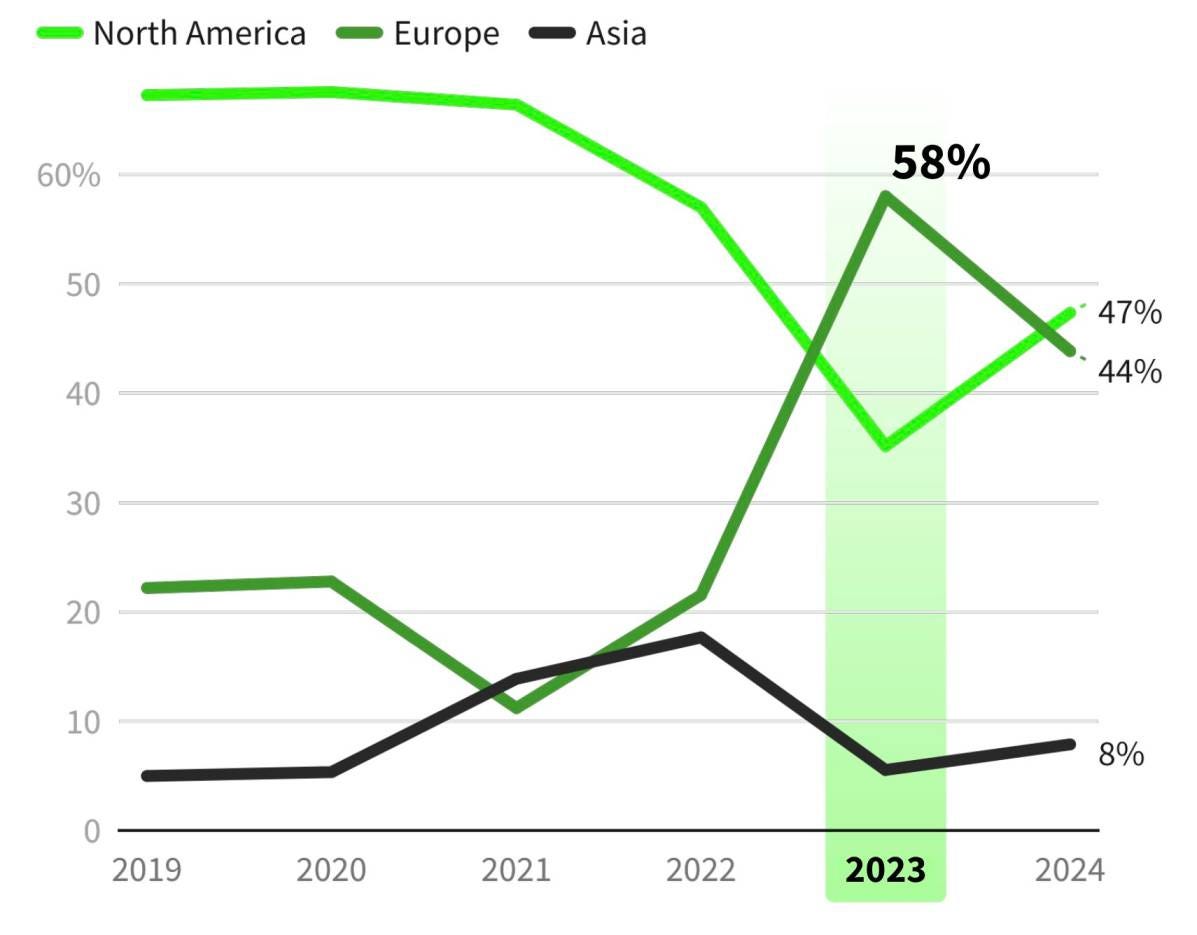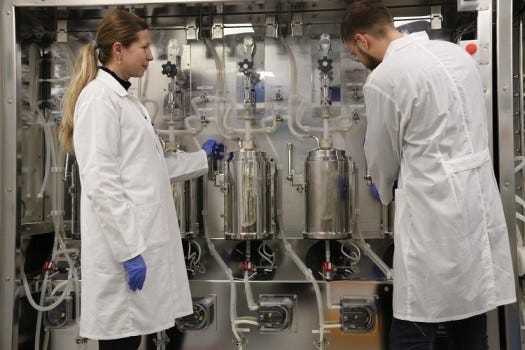€75M Bioeconomy Fund, Precision-Fermented Omelettes, and 90% Cheaper Cultivated Meat
Also: My conversation with biotech consultant and ex-CSO of Vow, James Ryall
Hi, welcome to issue #65 of the Better Bioeconomy newsletter. Thanks for being here!
I’m back after a 5-week break to study and settle into my new job. It feels good to write again, though I feel a bit rusty. It’s a process; I’ll get back to my flow eventually!🧘🏾♂️
Here’s my favourite quote that I came across this week:
“The way these stories are written is dangerous, because not only are they misleading, but they’re deliberately so. These news outlets aren’t stupid, they know exactly what they’re doing – slapping ‘vegan’ in your headline will get you clicks, as would ‘meat’. But objectivity and balance? Who gives a shit.”
- Anay Mirdul on media outlets using misleading headlines about plant-based meat
Let’s dig into the latest developments in biotech, shaping the future of food! 🍽
BIO TALK
🤝 My conversation with James Ryall: Bridging science and business to support startups using biomanufacturing
Based in Melbourne, Australia, James has nearly 25 years of experience in the biotech sector. Formerly the chief scientific officer (CSO) at the cultivated meat company Vow, he now advises and consults for early-stage startups and small—to medium-sized businesses.
As an honorary research fellow at the University of Melbourne, James contributes to biotechnology advancements through multiple peer-reviewed publications and patents.
James’ mission: “To partner with visionary founders and executive teams, leveraging a team-first approach to transform groundbreaking ideas into tangible products that redefine markets.”
Time at Vow
In 2019, James transitioned from academia to join Vow1, marking his entry into the biomanufacturing industry. As the CSO, James was pivotal in scaling Vow from a foundational team of just three (the two co-founders and a junior scientist) to a leading innovator in the cultivated meat industry with over eighty employees.
Under his scientific leadership, Vow expanded significantly, thanks to the collective efforts of the co-founders, Tim Noakesmith and George Peppou, and the rest of the team. The startup established a dedicated R&D lab and two manufacturing facilities. James helped manage transformative projects such as the infamous mammoth meatball and facilitated collaborations across industry, academia, and government sectors.
Additionally, James helped secure Vow's Seed and Series A funding, and has successfully secured over USD $3M in non-dilutive grant funding across his career.
Another standout accomplishment during James' tenure was the foundational work conducted by the “awesome” tech team, which laid the groundwork for Vow’s premium consumer brand, Forged. Upon earning Singapore regulatory approval in April this year, Forged launched the cultivated quail product in Singapore, a milestone that positioned Vow among the top cultivated meat companies.
How James is helping biotech startups
After leaving Vow in late 2023, James focused on the broader biomanufacturing sector, offering advisory and consulting services. He uses his expertise in stem-cell biology and regenerative medicine to help innovators tackle global challenges and create novel products.
He described his approach as “personalized and exploratory, starting with informal discussions to ensure mutual fit and value.” As a consultant, he guides a select portfolio of biomanufacturing companies, offering strategic advice on three core domains: technology, market and partnerships.
Positive developments in Australia's cultivated meat industry
Vow's regulatory application to the Food Standards Australia New Zealand (FSANZ) is a significant development, with approval expected by the end of the year. Success would position Australia and New Zealand as the fourth jurisdiction globally to approve cultivated meat sales, promoting mainstream acceptance and commercialization.
Another positive development in Australia, according to James, is the robust support from organizations like Food Frontier and Cellular Agriculture Australia, which provide resources, advocacy, and a conducive environment for innovation and growth.
Why James is bullish on B2B cultivated meat companies
B2B companies offer specialized solutions that address many of the challenges that early-stage cultivated meat startups face, such as scaling production, optimizing bioprocesses, and ensuring cost efficiency. “These B2B companies are not just participants; they are democratizing biomanufacturing, fostering an environment ripe with innovation and collaboration.”
James believes that new cultivated meat startups today have a significant advantage. 5 years ago, the necessary infrastructure was nearly non-existent, requiring companies to build everything from scratch. Existing components were designed for biopharma and were prohibitively expensive. In 2024, B2C cultivated meat companies can purchase or license almost all the building blocks needed to start producing prototypes immediately with the help of the B2B players.
A promising yet untapped area in cultivated meat
James identifies the sensory profile of individual cell types as a promising yet untapped area. Advanced -omics technologies could be used to characterize and harness unique flavors and aromas of different cell types.
This "flavor-omics" and "aroma-omics" approach could revolutionize how we think about cell types as ingredients, allowing for the creation of food products with tailored sensory profiles. James envisions a future where cultivated meat's sensory attributes are optimized at the cellular level, setting products apart in a competitive market.
Want to learn more about James?
Having interacted with James several times, I can personally attest to his eagerness to connect with others in the field, share insights, and foster collaborations. If you're interested, don't hesitate to reach out to him! You can also check out James’ brand new website to learn more.
BIO BUZZ
☕️ Landish Foods and The EVERY Company partner to launch high-protein coffee mixes with precision-fermented egg white protein
The new line of vegan, ready-to-mix protein powders for coffee and matcha drinks is called Fermy. The mixes contain 8g of protein, all 9 essential amino acids, no sugar, and are fortified with adaptogens like lion’s mane mushrooms and coconut MCT powder.
EVERY’s animal-free egg white protein is easy to digest (no bloating effects), is sustainably produced, and improves the taste and texture of the beverages.
However, while the Protein Coffee Enhancer and Protein Matcha Latte are certified vegan, they are not suitable for people with egg allergies as the precision-fermented egg white protein is “nature-equivalent” to chicken eggs.
Source: Green Queen
🇦🇪 AGWA and Believer Meats are partnering to develop cultivated meat production in Abu Dhabi
The collaboration supports Abu Dhabi’s new food and water cluster AgriFood Growth & Water Abundance (AGWA)'s agenda to improve food security and address water scarcity, aiming to create jobs and reduce dependency on imported food.
To build a dependable supply chain, the AGWA cluster uses technological innovations to adapt to evolving dietary preferences and promote progress in alt proteins, functional ingredients, algae farming, and reverse osmosis membranes.
With its head office in Abu Dhabi, Believer Meats plans to support commercial operations for regional market expansion, product manufacturing, and R&D. CEO Gustavo Burger views this partnership as a key step towards becoming a "global powerhouse" in cultivated meat and promoting a sustainable food system.
Source: Food Ingredients First
🍳 Grupo Palacios, the ‘world’s leading’ Spanish omelette maker, partnered with The EVERY Company
Grupo Palacios will incorporate the precision-fermented ‘EVERY Egg’ liquid egg into its flagship Spanish omelettes. Palacios generated €380 million in revenue in 2023 and has production plants in Spain, the UK, and the US. Its products are distributed in more than 50 countries.
The Madrid-based company praised EVERY Egg for its taste and added that its “ability to seamlessly blend into a wide range of dishes while maintaining the authentic taste and texture of a high-quality hen egg is remarkable.”
The EVERY Company aims to distribute its EVERY Egg ingredient in all markets where Palacios sells its Spanish omelette products. However, the rollout will depend on regulatory approvals and market success. The company is currently applying for regulatory approval in the EU.
Source: AgFunder
🌽 Syngenta and InstaDeep have partnered to accelerate seed trait research using AI Large Language Models
InstaDeep’s AgroNT1, a language model trained on trillions of nucleotides, interprets genetic codes to predict gene regulation and improve trait control and crop performance.
This advanced AI technology mimics natural processes and is designed to precisely forecast gene regulation, potentially offering enhanced trait control and improved crop performance.
Leveraging Syngenta’s proprietary trait R&D capabilities, the collaboration aims to deliver traits addressing agricultural challenges quickly. The initial phase will target trait design for corn and soybeans.
Source: Business Wire
⚡️ More buzzes
🇺🇸 Upside Foods is holding a one-night-only 'Freedom of Food' pop-up event to showcase its cultivated chicken in Miami, Florida on 27 June. The event is takes place just 4 days before Florida's ban on cultivated meat. (Cell Base)
MACRO STUFF
🇪🇺 European climate-focused food tech companies raised $2B last year, surpassing the US for the first time
The agtech sector attracted $1 billion, driven by sustainable fertilizers like Atlas Agro’s $325 million raise. Regenerative agriculture startups secured $581 million.
Fermentation startups saw a 12x increase in funding since 2020, reaching $76 million last year, with mycelium protein leading the surge in 2024. Meat analogues dominated the alternative protein sector, capturing over 70% of investments.
Alternative cocoa startups received $69 million in 2023, doubling from the year prior, driven by environmental, ethical, and economic factors.
Source: Green Queen
🇲🇾 Malaysia's Higher Education Ministry will study the feasibility of cultivated meat production
In collaboration with the Science, Technology and Innovation Ministry and the National Institutes of Biotechnology, this initiative is part of Malaysia's broader efforts to improve food security.
Agriculture and Food Security Minister Datuk Seri Mohamad Sabu highlighted the government's dedication to advancing food technology and securing a stable food supply.
Prime Minister Datuk Seri Anwar Ibrahim stressed the need for integrated and holistic efforts to adopt advanced technologies, such as cultivated meat, to ensure food quality and safety.
Source: Cell Base
🤦🏾♂️ Headlines claiming that plant-based meat increases heart disease risk are deliberate misinterpretations of a study to discredit the industry
The study, backed by the World Cancer Research Fund, analyzed health data from nearly 118,400 Brits and focused on ultra-processed foods (UPFs), not specifically plant-based meats.
Increasing non-UPF plant-based foods by 10% lowers cardiovascular and coronary heart disease risks by 7% and 8%, respectively. Conversely, a 10% increase in plant-based UPFs raises these risks by 5% and 6%.
Headlines ignored that plant-based meat made up only 0.2% of the diet in the study and that increasing animal-based UPFs by 10% also increases disease risks by 4%.
Source: Green Queen
📢 Techstyle For Social Good
The "Techstyle For Social Good" Global Innovation Challenge is back, and they're seeking out the most impactful sustainable breakthroughs!
Organized by The Mills Fabrica, this Challenge aims to support innovations that create a brighter future for our planet and society - with a special focus on transforming the apparel/textile and agrifood industries.
📅 The application window is open now until July 15th. To discover all the details and submit your brilliant idea, click here.
BIO BUCKS
🇮🇱 Ever After Foods secured $10M to advance cost-effective bioreactor platform for cultivated meat production
The funding round featured a second investment from Pluri and the Tnuva Group (largest food group in Israel), which formed Ever After Foods in 2022. The Israeli biotech holds exclusive licensing rights to Pluri's technology for cultivated meat production.
Initially focusing on beef and poultry cells, the latest investment expands the license to include seafood. The bioreactor platform, launched last year, can produce 10kg of meat with a 10-litre tank and has significantly advanced since.
The technology offers a 90% cost reduction for B2B clients and enhances yield. It provides up to 6X more protein and 700 times more lipids, improving flavour and nutritional value.
Source: Green Queen
🛠 University of Illinois ARCS received a $14.8M grant from Singapore’s National Research Foundation to launch a precision fermentation centre
The Centre for Precision Fermentation and Sustainability (PreFerS) will focus on microbial cell engineering or precision fermentation to convert sugars into alternative proteins, healthy fats, and vitamins.
The project supports Singapore’s goal of producing 30% of its nutritional needs locally by 2030 while mitigating climate impacts from conventional agriculture.
The University of Illinois Urbana-Champaign has had a research presence in Singapore since 2009. PreFerS will be situated alongside the Illinois ARCS offices at the National Research Foundation’s CREATE facility on the National University of Singapore campus.
Source: vegconomist
💸 Forbion launched ‘BioEconomy Fund I’ with an initial close of €75M
The fund will invest in companies developing sustainable biotech solutions in food, agriculture, materials, and environmental technologies.
Forbion BioEconomy Fund aims to raise €150 million by year-end, investing in 10-12 companies across Europe and North America. The investments will align with UN SDGs 9, 12, and 13.
Targeting companies at Series A and B stages with proven concepts, the fund seeks scalable, cost-effective B2B solutions. A strong pipeline of opportunities has already been identified.
Source: iGrow News
🧬 TraitSeq secured pre-seed funding to accelerate the development of AI-based platform that predicts complex crop traits
The UK-based agri-biotech company’s platform uses machine learning and RNA-Seq data to predict phenotypic traits. It helps agri-biotechs make data-driven decisions about gene-environment and treatment-environment interactions.
The funding will enhance its technology development team, boost commercial capacity, and increase the number of pilot projects, with commercial testing expected in 2025.
TraitSeq aims to strengthen its commercial offerings and customer relationships, building on existing revenue and grant funding.
Source: TraitSeq
💰 More bucks
Israeli biomass fermentation startup Brevel has been granted ~1,500,000 NIS (~$400k) from the Israel Innovation Authority. This funding will enable Brevel to improve its R&D efforts and develop a new product: functional lipids derived from microalgae for food applications. (Brevel)
SOCIAL FEAST
👩🏻🔬 Important steps for early-career scientists transitioning to industry and startups
Practice communicating science to generalists by competing in 3-minute thesis conferences and explaining your research to non-scientists to improve communication skills.
Learn advanced statistics by taking courses and using software like JMP or Stat-Ease to understand Design of Experiment strategies, which are valuable for efficient testing in industry.
Network with entrepreneurs by engaging with your university's startup hub to learn from them. This will help you understand cross-disciplinary collaboration and startup dynamics.
Credits: Katie Bashant Day
🤔 Why the benefits of processed foods are crucial to the success of alt proteins
Processed alt proteins have a longer shelf life, which helps reduce food waste significantly, both before reaching consumers and at the consumer level.
Alt proteins are often fortified with essential vitamins and minerals, ensuring consistent and reliable nutrient intake compared to fresh foods, which can lose nutrients during transport.
The production of alt proteins, such as cultivated meats and precision fermentation, adheres to strict safety and hygiene standards. This reduces the risk of foodborne illnesses common in conventional meat and fresh foods.
Credits: Maya Benami
MORE ON BETTER BIOECONOMY
💬 Bio Talks: Conversations with bioeconomy innovators
Synonym's co-founder, Joshua Lachter: Financing and Developing Infrastructure for the Bioeconomy
Bioshyft's founder, Gerrit Feuerriegel: Connecting Innovators, Investors, and Incumbents to Drive the Bioeconomy
Terra Bioindustries’s CMO, Rebecca Palmer: Turning Agrifood Byproducts Into Nutrient-Rich B2B Ingredients
That’s a wrap. Thank you for taking the time to read this issue!
Are you new here?
Know anyone else who would dig this newsletter?
Disclaimer: Better Bite Ventures, where I work, is an investor of Vow.









Glad to have you back in my inbox :)